Madison Warhawks The Perfect SeasonThe James Madison High School baseball team rode out a stormy 2001 season to reach the goal of goalsPublished: Summer 2003 The lengthening shadows of perfect summer night paralleled the impending conclusion to the perfect season for the James Madison Warhawks. A win against their rival and Central Region champ, J.R. Tucker of Richmond, would put the exclamation point on an undefeated season for this high school baseball team from Vienna, Virginia, and secure the Warhawks the Virginia AAA State Championship. But the perfect season wouldn’t come easy. The Warhawks were looking at extra innings as they came down to the last strike in the bottom of the seventh inning, First baseman Gabe Orsinger opened the seventh with a ground out, followed by a strikeout by State Player of the Year J.J. Hollenbeck. Outfielder Andrew Baird wiffed on a third strike in the dirt, but hustled to first when the ball rolled clear to the backstop. Sophomore third baseman Johnny Ayers stroked a single to left, advancing Baird to second. The stage was set for the Warhawks’ number-nine hitter (a .400 hitter all season!), outfielder Joe Lewin. Joe had missed much of the excitement of the Warhawks’ district championship football season due to injury, but he wasn’t going to miss anything now. Acting out every kid’s dream, he smashed the first pitch off the left centerfield wall, sending Andrew Baird home with the game-winning, state championship, perfect-season-clinching, run. The magical night still had one more “extra” inning to go, however. After a wild celebration with the large hometown contingent that had driven to Colonial Heights for the title match, the team and Head Coach Mark (Pudge) Gjormand hurriedly climbed on a bus headed back to Vienna. Still clad in their uniforms, unshowered but adorned with the sweet smell of success, the players joined the last moments of the Madison High School prom, to the thunderous applause of their classmates. The perfect cap to the perfect season. James Madison is the only high school in Vienna, a small, incorporated town in the midst of the affluent Northern Virginia suburbs of Washington, DC. Vienna has a long tradition of highly successful Little League baseball and youth football programs, with local teams frequently winning championships at the regional and national levels. Similar success had, until recently, eluded Madison High. In the spring of 2000 Coach Gjormand and Gordon Leib, who had been named head football coach in 1998, decided they both needed a year-round conditioning program to move their teams to the next level. For Coach Gjormand, whose teams had averaged 16 wins a year since 1995, that meant producing the nationally ranked team he had dreamed of since being hired. For Coach Leib, that meant building a winning, championship program after two injury-filled, bad-luck seasons that produced just three wins. Coach Leib and John Lingenfelter, a BFS magazine subscriber, convinced other Madison coaches that they all needed to be on the same page, particularly to facilitate the training of the many multi-sport athletes Madison depended upon to compete in its games against the larger-enrollment schools. The coaches agreed that the page should include BFS. They kicked off BFS participation with a clinic for all Madison athletes in June 2000. Success did not follow immediately, however, for either the football team or the baseball team. The 2000 football team, composed largely of sophomores and juniors, opened the season with eight straight losses. Two big, convincing wins against neighborhood rivals at the end of the season offered optimism to begin the off-season. Junior running back Ryan Ginley, who ran and kicked for 23 points in those two games, indicated, “We have a two-game winning streak going and we hope to keep that up next year.” Coach Leib felt that these wins came against teams that were better than the Warhawks at the beginning of the year, partial proof that in-season BFS work helped improve his team. The baseball team, also with many sophomores and juniors, ended the 2001 season on a sour note, falling short of the District Tournament title, and being eliminated in the first round of the regional playoffs. Angry that their talented, winning team (17-5) had squandered its opportunities, the sophomores and juniors made a strong commitment to each other that the story would be different next year. When asked how their perfect season happened, Coach Gjormand reflected that “this all goes back to the off-season.” He continually reminded his players that the off-season was for work, the in-season for fun. And work they did. The Warhawks bought into the BFS program with a vengeance in the summer of 2001. Johnny Ayers, a starter on both the football team and the baseball team, explained, “We’re working hard for a reason. It’s not just to look good on the beach—it’s sports-specific training that you know you’re doing for Friday night football or Tuesday night baseball. You know it will be there when you need it.” Andrew Baird, who would play key roles as a halfback and an outfielder in his junior year, later described the impact BFS had on the players. He saw the weekly successes the athletes experienced in breaking personal records in the BFS program as a confidence builder for each participant. He also believes that the camaraderie generated by working hard together built team cohesiveness that carried over to the season. Coach Gjormand believes that the success he and Coach Leib pursued started with the championship football season in 2001. Despite a bitter, last-minute opening game loss to rival Oakton High School, the Warhawks knew they had turned the corner when they won a key district game in overtime, 29-22 over W.T. Woodson High. Runs by Andrew Baird, Ryan Ginley and Joe Lewin supplemented B.T. Good’s passing to move the Warhawks to a 2-1 record, duplicating or exceeding their win totals of each of the three preceding seasons. Ginley indicated in a Sun Gazette story on the game that “an off season workout program called BFS had been invaluable” and as a result the Warhawks were “bigger, faster and stronger.” At last the Warhawks had won a close game against a quality opponent after three years of frustrating losses. The year-round BFS training program was making a difference. The Warhawks continued their newfound winning ways, capturing the district championship for the first time in five years. The Warhawks then advanced to the regional playoffs against Edison High School. Madison prevailed 20-14 in overtime, led by Tyier Lee’s 156 yards rushing and two touchdowns. Coach Leib feels that Lee’s ability to push through injuries and exhaustion—he carried the ball 27 times on offense and played outside linebacker on defense—was due in no small part to his BFS conditioning. The Warhawks lost the regional championship to Mt. Vernon High School the following week, but their 8-3 record and district championship made all their hard work well worth the effort. Reflecting on the startling reversal from their preceding season’s 2-8 record, Coach Leib gave the primary credit to the hard work of his players. He felt that their commitment to the BFS program, particularly the parallel squatting and box jumps, greatly increased their explosive power and speed. He is convinced that as a team they were stronger at the end of the year than at the beginning. Coach Leib, who at one time in his first year of coaching at Madison had 14 players on the injured list, believes that BFS limited the number and severity of injuries his team suffered, He still marvels at the beating that his undersized, gutsy quarterback and leader, B.T. Good, endured, while continuing to play—and making big plays. He attributes this, in part, to B.T.’s commitment to conditioning. Members of the Warhawks baseball team who were not playing football continued their summer workout schedule, including BFS, five to six days a week, two hours a day, throughout the fall. Football players Johnny Ayers, Andrew Baird, Josh Canova, Scott Findl |
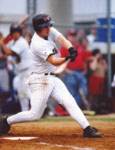 |
|
Gabe Orsinger All-Northern Region |
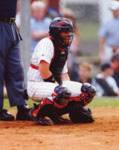 |
|
Matt Foley is an All-Metro Catcher who hit .543 and threw out 70 percent of those who dare run on him. |
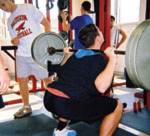 |
|
Junior Donnie Geary squats with great form |
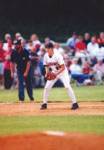 |
|
Johnny Ayers is a 3-sport athlete who uses the BFS program year-round |
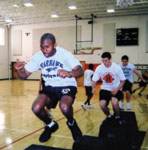 |
|
9th grader Warren Anderson doing plyos |
 |
|
J.J. Hollenbeck Virginia Player of the Year |